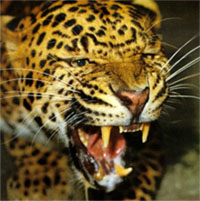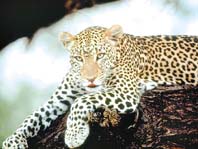| About China > Fauna & Flora > Class I Animals > Mammalia |
|
|
Leopard
With the alias of Gold-coin Leopard, or
Baozi and Wenbao, it belongs to the Felidae family of Carnivora order. Its
scientific names are Panthera pardus (Latin), and Leopard (English).
It weighs about 50 kilograms, and the body length is above 1 meter, with the tail exceeding half of the total length. It belongs to the type of large- or medium-sized beast of prey genera, with a shape similar but miniature to tiger. It has round head, short ears, four sturdy and strong limbs, and sharp claws with good retractility. Its body colors are vivid, with tan hair, and black spots and loop lines all over, forming old-coin-shaped stripes. Hence, it was given the name of "Gold-coin Leopard". Its belly is milky white.
It inhabits in multifarious environments, distributed from low mountains, hills to mountain forests and bushes, living in invisible and solid caves. It has extremely strong physical strength, sensitive vision and olfaction, and is highly alert. It is also skillful in swimming and climbing trees. The above abilities make it a daring and fierce carnivore with broad food choices. During the breeding period, the males fight impetuously for females. Its oestrus and mating are usually in April, and new babies are delivered in June or July, usually 3 babies per propagation. Young leopards leave the mother leopard in the following autumn to live by themselves, and grow to sexual maturity at the age of 2.5 to 3. Under breeding condition, its life span can reach as long as 20 to 23 years.
It was once widely distributed in northeastern China and south of the Yellow River; but now the quantity is very small. Leopard has been listed in Appendix I of International Trade Convention on Endangered Wild Animal and Plant Species. |
||||||
 |

